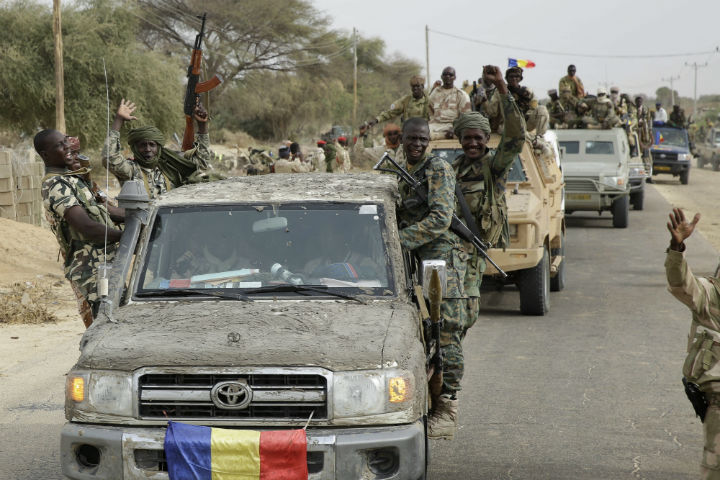PLEASE NOTE: This post was updated on Wednesday, March 25 to include government confirmation of the kidnapping.

Militant Islamist group Boko Haram kidnapped more than 400 women and children from the northeastern Nigeria town of Damasak, according to a report in the wake of the town being freed by armed forces from neighbouring Chad and Niger earlier this month.
“They took 506 young women and children. They killed about 50 of them before leaving,” Reuters quoted local trader Souleymane Ali saying. “We don’t know if they killed others after leaving, but they took the rest with them.”
According to Reuters, the was no initial confirmation from the Nigerian government. But government official Mike Omeri told The Associated Press (AP) on Wednesday a mass abduction occurred earlier this month. He couldn’t give an exact number, but confirmed it was in the hundreds.
Omeri, the spokesperson for Nigeria’s fight against Boko Haram, told AP Boko Haram fighters went to primary schools in Damasak and took students and teachers captive, before fleeing the town as Chadian and Nigerien troops moved in.
Damasak became a ghost of what it was before Boko Haram held the town of 200,000 people under siege for five months, according to the New York Times.
READ MORE: Islamic State militants accept Boko Haram pledge of allegiance
“Every looted and battered storefront yawns open to the dusty roadside,” New York Times reporter Adam Nossiter wrote March 20. “Mostly, the only sound in the hot, still air is from military vehicles, carrying soldiers from the neighboring countries of Chad and Niger as they make their way through the wreckage…”
Nigerien and Chadian forces pushed the Islamist group out of the town, located in Borno state – a Boko Haram stronghold and the same state where the schoolgirl kidnapping occurred last April — on March 18, killing an estimated 200 militants in the battle for Damasak and the nearby town, Malam Fatouri.
Nigerien and Chadian forces discovered a mass grave in Damasak containing at least 70 bodies — some with slit throats, others decapitated.
“The militants had been killing people before they fled,” the Wall Street Journal reported a military leader saying last week. “Possibly they didn’t have food to feed these potential captives or a way to move them.”
- Ex-cop accused of slaying 2 women, abducting child, kills himself in police chase
- U.S. is sending Ukraine longer-range weapons with new aid. Why it matters
- Four injured after military horses break loose, stampede in London, U.K.
- Arizona lawmakers move to repeal 1864 abortion ban after 2 failed attempts
READ MORE: Nigeria postpones Feb. 14 election so multinational force secures Boko Haram areas
But, Chadian military and government officials have criticized Nigeria for not pulling its weight in the fending off Boko Haram.
“The Nigerian Army has not succeeded in facing up to Boko Haram,” Chad’s foreign minister, Moussa Faki Mahamat told the New York Times. “The occupation of these towns, this is up to Nigeria. … My fondest wish is that they assume their responsibilities.”
President Jonathan and his government have faced international scrutiny for how they have handled the violent advance of Boko Haram – which aims to establish a caliphate in the north and eastern regions of Nigeria and has carried out a deadly six-year campaign of sieges and suicide bombings in an attempt to achieve that goal.
READ MORE: Worldwide rallies echo Nigeria’s call for return of kidnapped girls (May 10)
The reported kidnapping of more than 400 women and children comes nearly one year since the kidnapping of the schoolgirls, in the town of Chibok, on April 14, 2014. More than 270 girls, mostly Christians, remain missing and many are feared to have been married off to militants or sold as slaves.
The kidnapping turned international attention to Nigeria, with foreign governments offering support the attempts to locate the girls.
But since then, Boko Haram has carried out more abductions, as well as a series of massacres and suicide bombings.
Human rights group Amnesty International reported in January as many as 2,000 people had been slaughtered in the towns of Baga, Doron Baga and nearby villages over the course of several days.
Amnesty later released satellite imagery showing swathes of the community burnt to the ground.
READ MORE: Why coverage of the Paris shooting has overshadowed a massacre in Nigeria
The Nigerian government downplayed the purported death toll, saying only about 150 people were killed.
Nigeria retook the town last month, with the help of Chadian and Nigerien troops.
The organization said it could be the “deadliest act in a catalogue of increasingly heinous attacks” that Boko Haram has carried out in the past six years. Since taking up arms in pursuit of an Islamic state, the militant group has killed more than 13,000 people and displaced more than 1 million people from their homes.
The Canadian government lists Boko Haram as a designated terrorist entity. Boko Haram’s leader, Abubajar Shekau, recently pledged allegiance to ISIS.
With files from The Associated Press





Comments